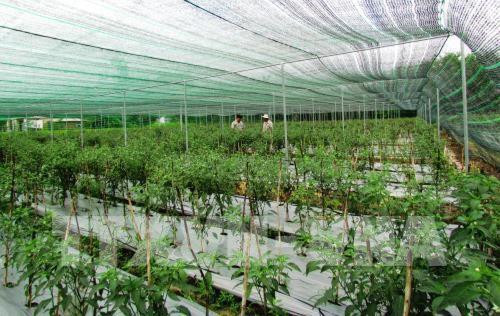 HCM City has become a magnet for high-tech agriculture thanks to its favourable business climate and large consumption market.
HCM City has become a magnet for high-tech agriculture thanks to its favourable business climate and large consumption market.(Photo: VNA)
HCM City (VNA) – Favourable business climate and a large consumptionmarket have made Ho Chi Minh City become an attractive destination forhigh-tech agriculture.
According to Tran Tan Quy, Vice Director of the municipal Department ofAgriculture and Rural Development, since the Government carried out Decree 35on supporting businesses’ development, the number of companies choosing tooperate in high-tech agriculture has shot up in the recent two years.
More than 300 new agro businesses were set up in the city in 2017, taking the totalto some 1,300 enterprises, he said, noting that the city targets to have 1,500high-tech agro firms by 2020.
Along with the state’s support, the city also shaped policies to encouragehigh-tech farming in the city during 2017-2020. Accordingly, agro businesses canget preferential loans if they can prove that their accounting books aretransparent and all of the process, from material purchasing, wage payment andbusiness contracts must be transacted through banks.
Meanwhile, the policies are also designed to support the development of high-techagricultural cooperatives, Quy said.
Responding to agro-businesses’ complaints about obstacles in accessing banks’loans, the city proposed that the State Bank of Vietnam pilot special lendingmodels based on the specific regulations applied to HCM City. The municipalDepartment of Agriculture and Rural Development will continue to open trainingcourses to help farmers, cooperatives and startups in agriculture build betterproduction and business plans in order to become eligible for loans.
Recently, several profitable models of hi-tech agriculture have earnedrecognition in the city. One of them is Nong Phat, which has applied VietGAPstandard in growing melon at its 2.3-hectare farm in Dong Thanh commune, HocMon district.
High-tech farming is also becoming a trend for suburban districts. Cu Chidistrict alone now has 26 high-tech farming models with a total area of 303.5ha, up 285ha from 2016. The farms focused on the production of safe vegetables,milk cow, orchid and ornamental trees, which are all suitable to the market’staste and local natural conditions.-VNA





























